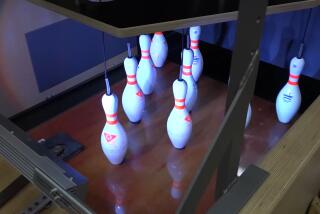TENNIS GOES HIGH TECH : New Balls Have ‘Voice’ That Does Job of Linesman
- Share via
PHOENIX — Penn Athletic Products, which introduced the yellow tennis ball in 1972, has begun manufacturing prototypes of an electrically conductive tennis ball expected to revolutionize the game.
The world’s largest tennis ball factory, three miles west of Phoenix, will produce 84 million tennis balls this year, 15,000 of them the Penn Accu-Call. Accu-Call looks like any other ball, same dimensions, same weight, same deflection, same bounce, same everything--except for the conductive materials embedded in the felt.
As it hits the court, the ball completes an electrical circuit, triggering a voice that says in, out, let or fault , eliminating the need for linesmen and, perhaps, taking the argument out of tennis. Sensitized areas along court boundary lines are wired to produce a signal that triggers the appropriate call at the judge’s stand.
In addition, colored lights are mounted on a fence behind the deuce court and the add court. For play, red indicates out, green in; for serve, blue indicates in, amber out. The same lights are repeated on a console for the umpire.
“The cost of Accu-Call balls will not be much more than regular balls,” said Matt Dingman, vice president of marketing and sales for Penn. “The system will save a bundle of money at pro tournaments, where the cost for linesmen working a typical one-week tournament runs between $25,000 and $30,000.”
Most important for the player, said Douglas Fonte, 49, president of Penn Athletic Products, a division of GenCorp (formerly General Tire & Rubber Co.), “is it will allow players to concentrate fully on the ball and not lose his or her concentration by watching the lines.”
“We expect the Accu-Call System and Accu-Call tennis balls to make a major impact on our industry and the game during the 1990s,” Dingman insisted.
According to Fonte, Penn tennis balls account for 53% of the tennis balls sold in America, with sales up 15% over last year.
Penn has an exclusive contract for production of Accu-Call balls with John Van Auken, 71, inventor of the Accu-Call System. Penn has worked with Van Auken the past three years in the development of the electrically conductive ball.
Van Auken, a lifelong tennis player who made his fortune as a pioneer in the photocopying field, has spent the past 15 years perfecting Accu-Call. Two years ago he moved from his Miami Beach, Fla., home to Sydney, Nova Scotia, to form Canadian Tennis Technology Co.
In a telephone interview at his Nova Scotia office, Van Auken explained that the Canadian government has provided grants totaling $800,000, matching his sale of 32 limited partnerships at $25,000 each to establish Canadian Tennis Technology.
“We are currently getting set to put a $5 million offering on the table through Merit Investment Corp. in Toronto. We have yet to decide whether to make it a private placement or public offering,” he said.
Van Auken said he “is going hell-bent for leather to gear up for production” which he expects to get under way by October. The Accu-Call system, he insists, is accurate to within 1,000th of an inch.
No One to Yell At
Three matches using Accu-Call balls on a wired court were played and televised Jan. 25 from Portland, Ore. An American team faced a Soviet team in three singles matches.
John McEnroe played Andrei Chesnokov, Andre Agassi played Alexander Volkov and Monika Seles played Natalia Zvereva. “There’s no one to yell at, “ said McEnroe when Accu-Call called his first serve out. On Feb. 7, Mats Wilander and Jimmy Connors used the balls in a match in Toronto.
Three months ago, a court with the Accu-Call system was installed on a trial basis at the Ontario Racquet Club in Mississauga, an affluent Toronto suburb. Two additional courts were put in service at the club recently.
At the trial courts in the Toronto suburb players are paying $1 extra an hour to use the system. Van Auken said the tentative plan is to lease the system initially for a minimum of a $1,000 a month.
Pennsylvania Rubber Co. first started making Penn tennis balls at Monroeville, Pa., in 1913. The company has been a leader in innovations for the game throughout its history.
Penn’s Phoenix plant currently manufactures two products, tennis balls that are distributed worldwide, and 85% of the racquet balls produced in the United States. The company has a plant in Kilkenny, Ireland, that supplies tennis balls throughout Europe.
Next spring, Penn plans to introduce a Pro Penn line of tennis racquets and tennis shoes designed by Jan Mathias of Beverly Hills, for sale exclusively in tennis pro shops.
Fonte said the company does not disclose gross sales, but said sales were between $50 million and $100 million a year. In its June issue, Sportstyle magazine shows Penn tennis balls leading the field with $40 million in sales last year, up $5 million from the previous year.
Sales of Wilson Tennis Balls, according to Sportstyle, were $32.5 million last year and about the same for the previous year, with Dunlop sales at $8 million and other makes at less than $500,000.
More to Read
Go beyond the scoreboard
Get the latest on L.A.'s teams in the daily Sports Report newsletter.
You may occasionally receive promotional content from the Los Angeles Times.










